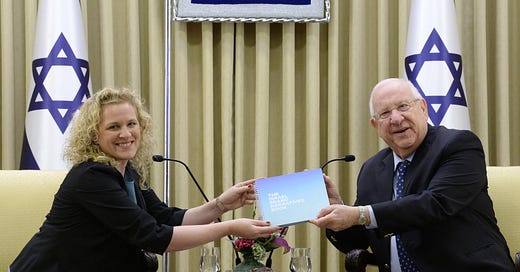If You Want to Defend Israel, Start Thinking Like a Marketing Executive

Imagine you’re walking into a supermarket. Your shopping cart is empty, and the shelves are bursting with products. But this supermarket isn’t like the one where you live.
You immediately notice the difference: instead of the “Breakfast Cereals” aisle, you see an aisle called “Travel Destinations.” Its shelves are brimming with places to visit abroad, enticing you to pick one for your next vacation. The “Made-In” aisle is where you may find a car, for example, but what you see is much more than the VW, Mini Cooper, or Lexus cars themselves. You see Germany, Great Britain, and Japan’s unique styles and traits welded into the machine. Then there are the “Real Estate Deals,” “Business Investments,” and the “Universities” aisles.
Welcome to the Supermarket of Nations, where people from all over the world shop every day — especially in its digital format, on social media. One of the countries they may come across in this supermarket is Israel. Now, ask yourself, would they pick “Israel” over any other product?
While the Jewish homeland truly has so much to offer, especially to the Next Generation — food, tech, social activism, modern dance, the list goes on and on — we cannot ignore the efforts of the Boycott, Divestment, and Sanctions (BDS) movement, to recast all perceptions of Israel in the mold of the Israeli-Palestinian conflict. We must respond; we would be foolish not to.
But we should not let them dictate how we manage Israel’s reputation in its entirety.
Unfortunately, many within our Tribe fall into this trap, perhaps not without reason. Even those of us who deeply love Israel agree that it has an image problem. Traditionally, the focus has been on directly taking on the anti-Israel narrative and countering it with rational, fact-based arguments.
However, this is a surefire way to give the BDS movement exactly what it wants: if we’re investing most of our resources and energy explaining Israel’s geo-political policies, our ability to showcase the country’s most attractive features — in the other aisles of the Supermarket of Nations, where everybody else is happily filling their carts — is significantly curtailed.
The Hebrew expression for “Israel Advocacy” is hasbara. Many people use the term, but non-Hebrew speakers often don’t know that its literal translation is explanation, or the act of explaining. The assumption is: first you need to agree with us, then you will like us. We think it works the other way around. Focusing almost all of Israel’s efforts on hasbara sidelines the fact that Israel is not a conflict; it’s a country. And countries need to thrive, not just survive.
Think of a non-Jewish teen or 20-something who has no obvious connection to Israel. If Israelis and Jews are always talking about conflict or confronting the Palestinian narrative, how will they see it for all that it has to offer? Now think of a young Jewish person, walking about in the Supermarket of Nations. Israel is there, but will they “buy” it? As we celebrate Israel’s 75th year of independence, how shocking is it that the answer is no longer a clear and resounding “Yes!”?
With this fresh perspective, you are hereby appointed the chief marketing officer of Israel. Your job is to make sure that the product “Israel” is placed strategically in the right aisle, in a prime location, and to make every effort to ensure that it stands out – for all the right reasons.
When you think like a marketer rather than an advocate, the entire playing field changes, as do the strategies, the tools at your disposal, and your metrics for success. In the last 20 years, this is what almost every other country has recognized, investing tens — even hundreds — of millions of dollars in marketing and branding their offering to targeted audiences, shifting global perceptions in the direction of their choosing.
For the product “Israel” to remain competitive in the Supermarket of Nations, we need to think a lot more like chief marketing officers, and a little less like advocates or crisis managers. There’s room for both schools of thought and action — but it’s high time we give the former a fighting chance to prove itself. The future of Jewish Peoplehood depends on it.
This article is adapted from the book Ethical Tribing: Connecting the Next Generation to Israel in the Digital Era.





